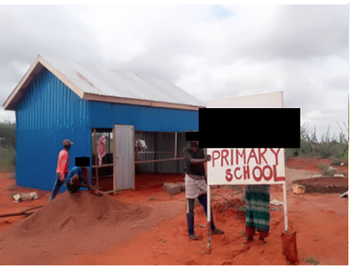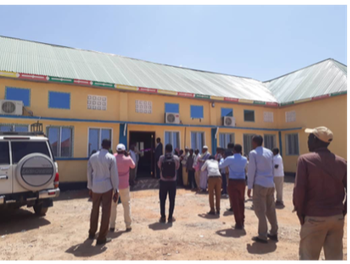Two billion people live in countries where development outcomes are affected by fragility, conflict and violence. By 2030, up to two-thirds of the world’s extreme poor could live in fragile contexts. Because of the security risks and the weakness of state institutions, providing essential services is particularly challenging in these areas.
In such contexts, citizens often play an outsized role in directly financing essential public goods and services outside of the state. In Gedo region in southern Somalia, for example, state taxation is extremely weak. Citizens step in in its place, with over 70 percent of households paying informal taxes or fees, representing on average of 9.5 percent of annual household income. While the nature and prevalence of informal taxes varies substantially across the country, it is clear that Somali citizens play a significant role in directly financing development and service provision.
Building on informal taxation and local collective action
In this context of fragility and weak state institutions, our research in Gedo region explores the ways in which international organisations and NGOs and local leaders can build on this strong foundation of informal taxation and local collective action. Under a recent community-drive development programme in south-central Somalia, known as the DIALOGUE project, two NGOs— one international and one Somali — partnered to provide grants to communities that matched revenues raised by communities through informal taxes. Through this programme, communities were better able to finance public goods, while the quality of public goods improved. Communities across the region built schools, restored roads, and even built a local airport terminal in Dollow, close to the Ethiopian border.

Impacts of bypassing state institutions?
While being able to better deliver essential public goods is undoubtedly a positive outcome, it is nevertheless important to consider the impacts of bypassing the state and normal channels of public goods financing — in other words, taxation.
For one, there is a question of whether citizens will view the state as less legitimate where they are paying for public goods directly — essentially, doing the job of the state. This is particularly important in the context of Somalia, where both the central and local governments are trying to extend the state’s reach and authority across the country. In Gedo region and Jubbaland state, it is even more important, given the continued presence of al-Shabab and the region’s history of tension with the federal government, both of which can threaten the state’s authority.
Somewhat surprisingly, in the case of Gedo region, we find that the direct financing of public goods through informal taxes actually strengthened citizen perceptions of the local state and its legitimacy. This may in part be because citizens in fragile contexts have relatively low expectations about what the government should do. Instead of expecting government to provide services directly, citizens may be supportive of a role for the government in facilitating or lobbying for development.
While these findings suggests a positive complementary between informal institutions and local governments, important risks remaining when relying upon informal taxes to finance essential goods. For example, local leaders who are responsible for raising informal revenues are not necessarily accountable to local citizens or inclusive, with such initiatives risking the exclusion of minorities and sub-populations, including women. This is a particular concern in Gedo region, where minority clan groups are marginalized from political and economic opportunities, and women often lack meaningful political voice.
Meanwhile, informal taxes have been shown in many contexts, including southern Somalia, to be inequitable, with a greater proportional burden falling on poor households relative to wealthy ones. Of course, where the public finance system is weak or non-existent, formal channels of revenue generation and redistribution may not be more equitable. Nevertheless, it is important to recognize the uneven burden that informal taxes can have on citizens, as well as the risk that encouraging informal taxes may reinforce an inequitable distribution of power and a non-universal conception of citizenship and rights.

Financing public services in fragile context
Despite these persistent risks, the results of this community-driven development programme in Somalia have important implications for understanding possibilities for service provision and citizen-state relations in conflict-affected contexts. Based on our experience in Gedo region, it seems that international donors can support public goods provision through collaboration with local communities, without undermining — and perhaps even strengthening — state legitimacy. Working directly with citizens and community leaders may not only be an effective way of delivering services in difficult contexts, but may actually help to strengthen and build government capacity at the local level.
Download the full research paper produced by our content partner, the International Centre for Tax and Development (ICTD): ‘Co-Financing Community-Driven Development Through Informal Taxation: Experimental Evidence from South-Central Somalia’.
The opinions expressed in this article are those of the author(s) and do not necessarily reflect the views of SAIIA.
(Main image: )
